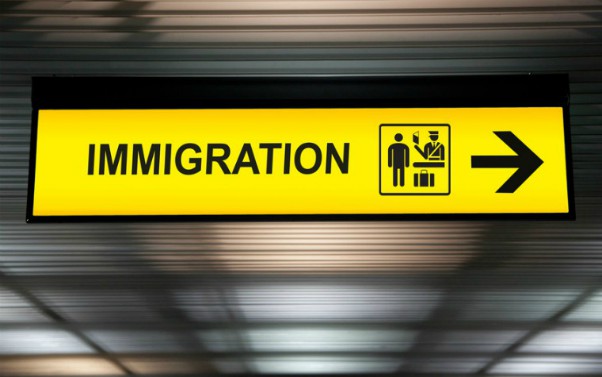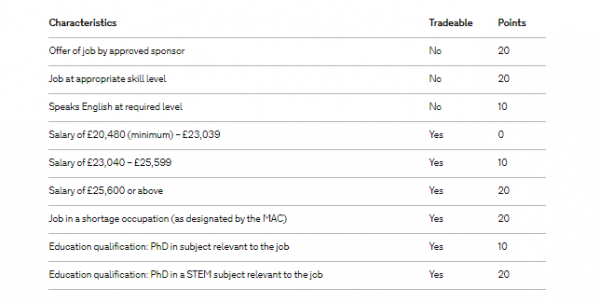
Government post-Brexit immigration plans would “spell absolute disaster” for social care, leaving more people without care or unnecessarily in hospital, sector bodies say.
The new system, to take effect from 1 January 2021, will require skilled workers from overseas to reach a points threshold in order to obtain a UK work visa.
No care worker would qualify under the system and only a tiny minority of senior care staff would. While this is true of the current system in relation to staff from outside the European Economic Area (EEA), free movement of workers from within the EEA has provided a rising proportion of staff for the care sector (8% of England’s independent sector workforce in 2018-19, up from 5% in 2012-13).
‘More would go without care’
Colin Angel, policy director at United Kingdom Homecare Association (UKHCA), said UKHCA was “dismayed” by the decision.
“Cutting off the supply of prospective care workers under a new migration system will pave the way for more people waiting unnecessarily in hospital or going without care.”
He also criticised the government’s view that employers should adjust to the end of free movement.
“Telling employers to adjust, in a grossly underfunded care system, is simply irresponsible,” he said.
UNISON assistant general secretary Christina McAnea said the immigration plans “spell absolute disaster for the care sector”.
“Companies and councils can’t recruit enough staff from the UK so have to rely on care workers from elsewhere, but even with these migrant employees, there’s still way too few care workers to meet demand,” McAnea said.
McAnea said suddenly ending this “desperately needed supply of labour” will cause huge problems across the country and urged the government to think again.
“The government needs to get to grips with social care urgently. It must fund care properly, with increased wages and training to make care an attractive career for UK residents and migrant workers alike,” she said.
What the new system will look like
 Applicants to come to the UK as a ‘skilled worker’ will have to meet a number of criteria to reach a total of 70.
Applicants to come to the UK as a ‘skilled worker’ will have to meet a number of criteria to reach a total of 70.
While care workers could attain 30 points from a job offer from an approved sponsor (20 points) and being able to speak English at the required level (10 points), this appears to be the maximum they would get.
Senior care workers would likely reach 50 points, as they would obtain the 20 points from having a job at the appropriate skill level, which is based on being qualified at RQF3, equivalent to having A-levels. According to the latest categorisation, senior care workers have this level but care workers do not.
Salary threshold is another criteria in which most care workers, including senior staff, are unlikely to pick up points. According to the latest Skills for Care annual report on the workforce, a senior care worker in the independent sector earned £17,600 on average in 2018-19, while care workers earned £16,200. To earn an extra 10 points, an applicant must earn between £23,040 and £25,599, then £25,600 or more for an extra 20 points.
A further 20 points is awarded for working in a sector with shortages but currently neither senior care workers nor senior care workers are on the Migration Advisory Committee’s list of designated shortage occupation.
Low pay at root of problems – government advisers
In a January report for the government, looking at how to implement ministers’ ambitions for a points-based immigration system to replace free movement from the EEA, the independent Migration Advisory Committee (MAC) said the sector’s problems were rooted in low pay, not immigration policy.
“We remain of the view that the very real problems in this sector are caused by a failure to offer competitive terms and conditions, something that is itself caused by a failure to have a sustainable funding model,” the report said.
However, while the government has, in effect, gone ahead with the MAC’s proposals, it did not refer to tackling social care’s funding challenges in its immigration statement, nor is there any news as yet on how it plans to implement the Conservative manifesto pledge to find a long-term solution to the sector’s problems.
Care staff ‘not low-skilled’
Some sector leaders challenged the idea implicit in the government’s plans that care work was low-skilled.
Julie Ogley, president of the Association of Directors of Adult Social Services (ADASS), said: “We cannot get the care and dignity we need without brilliant carers and it is shameful that care work is described as low-skilled.
“Yesterday’s announcement underlines exactly why the government needs to urgently bring forward proposals for reform of the social care system and provide investment to reward and remunerate staff for their hard work with a workforce plan that compliments the NHS one shortly to be published.”
Saffron Cordery, deputy chief executive of NHS Providers, said: “The government’s decision to lower the salary threshold does nothing to address the dire staff shortages we see in the social care sector, on which the NHS and public depends.
“Low pay does not mean low skill, we urgently need people to take up these vital and rewarding careers within social care.”
How existing workers can remain in the UK
While the immigration plans will halt care workers coming in from the EEA to work in the care system, existing staff will have until June 2021 to register to stay in the UK under the EU Settlement Scheme.
Staff from the EEA or Switzerland and their family members will be able to stay in the UK indefinitely if they have been continuously resident for five years as of 31 December, 2020, obtaining ‘settled status’. Those who have not been in the UK for five years can apply for pre-settled status, enabling them to stay until their five years are up, after which they can apply for settled status.
So all existing staff from the EEA or Switzerland will be able to stay so long as they remain in the UK and do not have any criminal convictions.


 Assistive technology and dementia: practice tips
Assistive technology and dementia: practice tips  A trauma-informed approach to social work: practice tips
A trauma-informed approach to social work: practice tips 




 Find out how to develop your emotional resilience with our free downloadable guide
Find out how to develop your emotional resilience with our free downloadable guide  Develop your social work career with Community Care’s Careers and Training Guide
Develop your social work career with Community Care’s Careers and Training Guide  ‘Dear Sajid Javid: please end the inappropriate detention of autistic people and those with learning disabilities’
‘Dear Sajid Javid: please end the inappropriate detention of autistic people and those with learning disabilities’ Ofsted calls for power to scrutinise children’s home groups
Ofsted calls for power to scrutinise children’s home groups Seven in eight commissioners paying below ‘minimum rate for home care’
Seven in eight commissioners paying below ‘minimum rate for home care’
 Facebook
Facebook X
X LinkedIn
LinkedIn Instagram
Instagram
It’s really apaling how unsympathetic and irresponsible this government is. They are all over the news, claiming 8 million Britons are not in employment, but never mention how many are disabled, in care, prison etc. So how realistic is it to bring those 8 million into employment… Not that realistic is it? Then there’s care workers that are on zero hour contracts companies push for lower wages, it’s all a smables.
It’s time to admit that without all the immigrants, the UK wouldn’t have been where it’s at and will never be any greater. But I suppose you can always privatise and outsource health services and all the other services and let the poor folk manage by themselves.
pay the care workers well, you may get British workers to do the carework!
We need to be able to remove the parasitic agencies/middle men and instead instruct the government to directly fund the sector. Perhaps then we would be able to pay the carers a decent salary and there may be more indigenous people willing to do the work. As it is, the unsociable hours and the money paid that barely covers living costs, means that no-one is in a position to remain long in the job. At the moment the councils outsource, as they have been tempted by ludicrously low bids. All the corners have been cut from the actual cost of the care being provided to ensure owners and shareholders are first to siphon off their cut. I know that the agency (for example) will charge the council £18/hr and pay the worker half of that. Travel time is not covered and the worker has to log in and out so that wages reflect the time of the visit exactly and not a minute more. This leads to a demoralised and demotivated work force who feel undervalued and mistrusted.
It cannot be beyond the wit of the government to organise an in house system managed along the lines of a business, but with the inclusion of the workers and with the oversight of a robust quality care commission.
If this doesn’t happen, then those of us yet to grow old will have to be prepared to suffer or ensure that we have independent means in place to take care of ourselves.
Some time half an hour visit.Walking in the street in rain, snow, wind or waiting for the next visit somewhere.
And foot pain is sure because of the distancances between the patients.
Half an hour not enough time for personal care and to hoist the patient from bed to chair and gave some drink make the notes in log book and there is no time to talk to the patient.The carer have to be always rush.I saw many carer left the job because of this.
Too many self defined liberal people have always accepted that certain jobs don’t need to be paid well and so are suitable for “foreigners” only. While they see university education as a fundamental right to their children and themselves, they are happy to support oppressive capitalism to facilitate their privileges. The UK has exploited the education and skills of the developing world by appropriating people and using them to subsidise services here. Private care charges are in the high hundreds of pounds weekly yet wages and working conditions don’t reflect that. We as social workers have colluded with this.